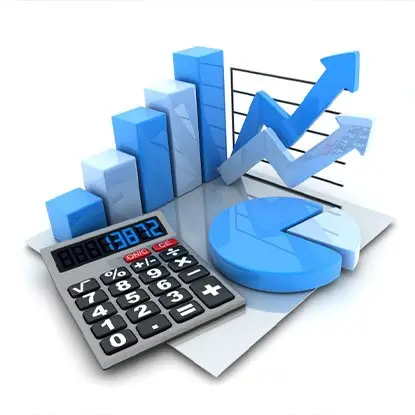Understanding the Importance of Cost Accounting and Financial Reporting in ERP
Unlock financial insights: Discover the power of cost accounting and advanced financial reporting in ERP!

Unlock financial insights: Discover the power of cost accounting and advanced financial reporting in ERP!

In today’s fast-paced business world, companies must be equipped with the right technology and tools to remain competitive and profitable. ERP (Enterprise Resource Planning) is one such tool that has revolutionised how businesses operate. ERP systems integrate all aspects of business operations, including inventory management, purchasing, production, finance, HR, and more.
Within an ERP system, cost accounting and financial reporting are two vital functions that help companies gain insight into their financial health, identify key performance indicators, and make informed decisions about future investments and growth. In this article, we’ll explore the importance of cost accounting and financial reporting in ERP and how they can help businesses thrive.
Unlock the full potential of your cost accounting and financial reporting with Artsyl docAlpha integrated into your ERP system. Make your financial processes more accurate and reliable by eliminating manual data entry errors. Experience the future of automated data capture and real-time synchronization!
Book a demo now
Cost accounting is a vital and comprehensive process that plays a crucial role in the financial management of businesses. It involves meticulously tracking, analyzing, and allocating costs related to various aspects of business operations, offering valuable insights into a company’s true financial performance and efficiency.
At its core, cost accounting focuses on accurately capturing all the expenses incurred throughout the production, distribution, and sales processes. This includes direct costs like raw materials, labor, and manufacturing expenses, as well as indirect costs such as overheads, utilities, and administrative expenses.
By methodically recording and categorizing these costs, businesses can gain a deeper understanding of their cost structure, identifying areas where resources are being optimally utilized and pinpointing potential areas for improvement.
Take control of your financial data with Artsyl docAlpha’s integration. Empower your cost accounting and financial reporting by automating data capture, validation, and reconciliation processes. Ready to revolutionize your ERP’s financial capabilities?
Book a demo now
The ERP system is a central hub for all financial data, including cost accounting and financial reports. As a result, the system provides a 360-view of business operations, which empowers decision-makers to make more informed decisions.
By combining cost accounting and financial reporting in the ERP system, businesses can gain valuable insights into financial data, which, in turn, can help them optimize production processes, reduce costs, and increase profitability.
Cost accounting in ERP (Enterprise Resource Planning) systems is a crucial component that enhances a business’s overall financial management and decision-making processes. ERP software integrates various business functions into a unified platform, including accounting, inventory management, human resources, and more. Within this integrated framework, cost accounting is significant in providing accurate cost data and insights for effective financial analysis and planning. Here are some key aspects of cost accounting in ERP systems.
ERP systems enable allocating costs to different cost centers, departments, projects, or products. This accurate cost allocation helps determine the true costs associated with specific business activities, providing a comprehensive view of the organization’s financial performance.
ERP systems facilitate real-time tracking of costs across various business processes, from procurement to production and distribution. This real-time data ensures businesses have up-to-date cost information, enabling quick and informed decision-making.
ERP’s cost accounting functionality allows businesses to analyze costs from multiple perspectives. It enables cost variance analysis, where actual costs are compared to budgeted costs, helping identify areas where costs deviate from projections.

Some ERP systems support activity-based costing, a method that allocates costs based on specific activities. ABC provides a more accurate understanding of how resources are utilized within the organization and help identify cost drivers.
ERP systems help businesses optimize costs by identifying inefficiencies and cost-saving opportunities. With detailed cost data, companies can make data-driven decisions to improve operational efficiency and reduce unnecessary expenditures.
Recommended reading: Making the Case for AP Automation: ROI and Cost Savings
ERP systems support different costing methods, such as standard, actual, or average. Businesses can choose the most suitable method based on their operations and industry requirements.
ERP’s cost accounting functionality ensures accurate inventory valuation by considering the actual costs incurred during procurement and production. This ensures that the balance sheet reflects the true value of inventory.
ERP systems generate various cost-related reports, such as cost center reports, job costing reports, and product costing reports. These reports provide management with valuable insights into the cost structure and profitability of different aspects of the business.
In summary, cost accounting in ERP systems enhances financial visibility, enables data-driven decision-making, and empowers businesses to optimize costs and improve overall financial performance.
By integrating cost accounting into the ERP framework, organizations can effectively manage and control costs, gain a competitive advantage, and achieve sustainable growth.
Simplify your cost accounting and financial reporting with Artsyl docAlpha’s seamless ERP integration. Watch as your financial data is automatically captured, verified, and synchronized in real-time. Experience the power of data accuracy and unlock new insights for better decision-making.
Book a demo now
Enterprise Resource Planning systems is a critical component that provides businesses with comprehensive and accurate insights into their financial performance. ERP systems integrate financial data from different business functions, creating a unified and centralized financial reporting and analysis platform. Here are some key aspects of financial reporting in ERP:
In summary, financial reporting in ERP systems streamlines and enhances the financial reporting process, providing businesses with accurate, real-time financial information. This enables informed decision-making, regulatory compliance, and improved financial management, ultimately contributing to the organization’s success and growth.
Drive business success with Artsyl docAlpha’s ERP integration. Eliminate manual data entry headaches and supercharge your cost accounting and financial reporting. Stay ahead of the competition with real-time data synchronization and customizable reporting.
Book a demo now
Financial reporting is a crucial function within an ERP system that helps companies stay on top of their financial performance and meet regulatory reporting requirements. With financial reporting tools in ERP, companies can generate reports that provide a real-time view of their financial health, including income statements, balance sheets, and cash flow statements.
These reports can be customized to meet the needs of stakeholders such as investors, auditors, and regulatory agencies.
Moreover, the reports generated by ERP systems are accurate, reliable and time-efficient, which means businesses can focus on growing their business instead of spending hours on manual reporting.
Recommended reading: Uncovering Hidden Costs in Application Development
Implementing cost accounting and financial reporting within the ERP system requires careful planning, execution, and leveraging the right technology solution. The first step in implementing cost accounting and financial reporting is to define the project’s goals, objectives, and expected outcomes.
The project team should include relevant IT, finance, and operations stakeholders. Additionally, businesses need to consider the expertise of their team and determine if they have the necessary skills to implement and maintain cost accounting and financial reporting within the ERP system. Finally, selecting the right ERP software and provider is essential for success.

Experience seamless data capture, workflow, and reporting automation, resulting in increased accuracy and efficiency.
Artsyl docAlpha integration plays a significant role in supporting cost accounting and financial reporting in ERPs by streamlining data capture, processing, and analysis. Here’s how the integration contributes to these crucial financial functions:
Artsyl docAlpha utilizes advanced Optical Character Recognition (OCR) and Intelligent Document Recognition (IDR) technologies to automatically capture data from various documents, such as invoices, purchase orders, and receipts. This automated data capture eliminates manual data entry errors, ensuring accurate and reliable financial information for cost accounting and financial reporting.
docAlpha’s integration with ERPs includes data validation and verification capabilities. The solution cross-references captured data with existing ERP data, ensuring data integrity and minimizing the risk of incorrect information entering the system. This ensures the accuracy of financial reports and cost accounting records.
Integrating ERP with docAlpha automates the workflow for processing financial documents, such as invoice approval, purchase order matching, and payment processing. This streamlined workflow reduces processing time, enables quicker financial reporting, and facilitates efficient cost allocation and analysis.
Artsyl docAlpha’s integration with ERPs allows for seamless matching of purchase orders and invoices. The solution automates the reconciliation process, ensuring that invoices are matched with corresponding purchase orders and accurately reflected in the ERP system. This supports accurate cost allocation and financial reporting, preventing discrepancies in financial data.

The integration enables real-time data synchronization between docAlpha and the ERP system. As financial data is captured and processed in docAlpha, it is seamlessly updated in the ERP, providing up-to-date and accurate financial information for reporting and analysis.
Artsyl docAlpha offers customizable reporting capabilities, allowing businesses to generate financial reports tailored to their specific requirements. This includes reports on expenses, revenue, cash flow, and other financial metrics needed for cost accounting and financial reporting.
Recommended reading: How Data Engineering Services Support Enterprise Growth
By automating data capture and processing, Artsyl docAlpha helps ensure compliance with financial reporting standards and regulatory requirements. The solution provides a detailed audit trail, facilitating easier and more accurate audits.
With accurate and timely financial data available through the integration, businesses can perform in-depth data analysis, including cost analysis, variance analysis, and key performance indicator (KPI) tracking. This supports better decision-making and financial planning.
In conclusion, Artsyl docAlpha’s integration with ERPs significantly enhances cost accounting and financial reporting processes. By automating data capture, validation, and processing, the solution ensures accuracy, efficiency, and data integrity, ultimately leading to more informed financial decisions and improved financial management for businesses.
Simplify cost accounting and financial reporting with Artsyl docAlpha’s integrated solution. Embrace the future of automation, accuracy, and real-time data synchronization. Watch as your ERP becomes a powerhouse of financial intelligent process automation.
Book a demo now
Cost accounting and financial reporting are two critical functions within the ERP system that helps businesses gain valuable insight into their financial performance. With cost accounting, businesses can better understand the costs associated with production and optimize their processes. On the other hand, financial reporting provides stakeholders with real-time information about a company’s financial health. It’s essential for businesses considering ERP systems to understand the two functions and explore the technology providers that can help them implement them as seamlessly and effectively as possible.
Growth and profitability are critical to any business. Cost accounting and financial reporting within an ERP system can help them achieve both goals.

Simplify cost accounting processes with docAlpha’s AI and machine learning. Automate data extraction, reduce errors, and provide precise insights to streamline expense tracking and financial management.
Drive cost efficiency with docAlpha - schedule a demo today!